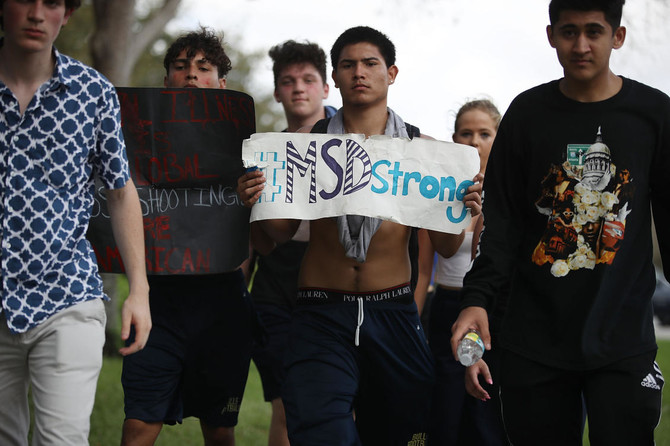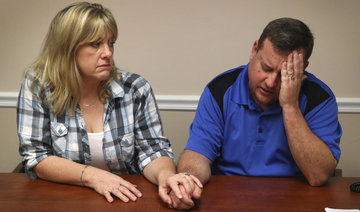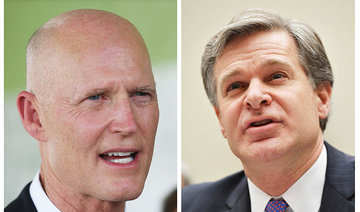TALLAHASSEE, Florida/WASHINGTON: Dozens of teenaged survivors of the second deadliest public school shooting in US history marched on Florida’s capital on Wednesday to ask lawmakers to ban sales of assault rifles of the sort used to kill 17 students and educators last week.
Marjory Stoneman Douglas High School in Parkland, Florida, became the latest school targeted by a gunman using a semi-automatic AR-15 assault rifle, heated up the nation’s long-running debate about gun rights and public safety.
Dressed in jeans and T-shirts and carrying signs with the slogan “#Neveragain,” survivors of the Feb. 14 mass shooting met with lawmakers in Tallahassee, to ask for stricter controls on gun sales.
Investigators said the assault was carried out by 19-year-old former student Nikolas Cruz, who purchased an AR-15 nearly a year ago. Police have charged Cruz, who had been kicked out of Douglas for disciplinary problems, with 17 counts of premeditated murder.
“We want to see some common sense gun laws so this will never happen again,” said Rachel Padnis, a 16-year-old sophomore from the school near Fort Lauderdale.
She and classmates said they were dismayed but undeterred by the state’s Republican-controlled legislature’s Tuesday rebuff of a bid to bring up a bill to block sales of assault rifles.
President Donald Trump, a strong supporter of gun rights, was due to meet later Wednesday with parents, students and teachers who have been victims of gun violence, including those affected by the Valentine’s Day shooting in Florida.
The White House meeting comes a day after Trump said his administration would take steps to ban bump stocks, an accessory that enables a rifle to shoot hundreds of rounds a minute. A spokeswoman said the administration was open to the idea of setting national age limits on sales of assault rifles.
Florida state Sen. Bill Galvan, slated to be the upper chamber’s next president, has called for a bill to raise the legal age for purchasing assault rifles from 18 to 21, the same as it is for handguns.
At the Florida capital in Tallahassee, dozens of students packed into a meeting room and peppered Senate President Joe Negron, a Republican, with questions about why individuals should have continued access to assault rifles.
Negron declined to say whether he would support any specific gun control measures, saying, “That’s an issue we’re going to look at as we work to develop legislation.”
Trump talks
US President Donald Trump, a strong supporter of gun rights, was scheduled to host a “listening session” with high school students and teachers at the White House on Wednesday.
Trump’s support for any tightening of gun laws would mark a change for a Republican who was endorsed by the National Rifle Association gun lobby during the 2016 presidential campaign.
The NRA opposes an outright ban on bump stocks but has said it would be open to restrictions on the devices.
Under pressure after Parkland, the deadliest-ever shooting at a US high school, Trump on Tuesday directed the Justice Department to quickly complete a proposed rule that would treat “bump stocks” as machine guns, which could effectively outlaw them in the US.
Last October, a retired real estate investor and high-stakes gambler used multiple assault rifles equipped with bump stocks to kill 58 people at a Las Vegas outdoor concert, the deadliest attack by a single gunman in US history. Bump stocks have not played a prominent role in other recent US mass shootings.
Later this week, Trump will meet with local and state officials, and plans to talk with governors about the issue.
Trump generally favors a Senate bill on background checks, White House press secretary Sarah Sanders said Tuesday.
Calls for national student walk-outs and marches in the coming months have gained steam on social media, including the “March for Our Lives” on March 24 in Washington, spearheaded by Douglas students.
Scattered school walkouts in support of the Florida students were planned around the US on Wednesday, according to officials and local media.
The NRA has agreed to participate in a televised town hall on guns to be broadcast by CNN later today, the news network said. NRA officials did not immediately respond to requests for comment.
Gun violence on public school and college campuses has become so commonplace in the US in the last several years that administrators regularly stage drills to train students and staff in the event of a mass shooting.
Florida school massacre survivors push lawmakers for assault gun ban
Florida school massacre survivors push lawmakers for assault gun ban

Trump touts ‘great progress made’ on first day of US-China tariff talks

- "A total reset negotiated in a friendly, but constructive, manner,” Trump wrote on his Truth Social platform
- US delegation led by Treasury Secretary Scott Bessent is meeting in Geneva with the China team led by Vice Premier He Lifeng
GENEVA: The first day of sensitive talks between US and Chinese delegations over tariffs that threaten to upend the global economy ended without major breakthroughs being announced, but President Donald Trump nonetheless touted “GREAT PROGRESS.”
The meeting lasted over 10 hours in Switzerland and featured Treasury Secretary Scott Bessent, US Trade Representative Jamieson Greer and a delegation led by Chinese Vice Premier He Lifeng.
Hours after talks had concluded, Trump took to social media to suggest that a full reset of trade between the US and China could be on the table.
“A very good meeting today with China, in Switzerland. Many things discussed, much agreed to. A total reset negotiated in a friendly, but constructive, manner,” Trump wrote on his Truth Social platform. “We want to see, for the good of both China and the US, an opening up of China to American business. GREAT PROGRESS MADE!!!”
But he gave no further details, and officials at the White House also offered little information during and after the opening day of discussions.
Trump’s post followed an official telling The Associated Press that talks had wrapped up for the day and would continue Sunday. The official requested anonymity because of the sensitivity of the discussions, which could help stabilize world markets roiled by the US-China standoff. The talks have been shrouded in secrecy, and neither side made comments to reporters on the way out.
Several convoys of black vehicles left the residence of the Swiss ambassador to the UN in Geneva, which hosted the talks aimed at de-escalating trade tensions between the world’s two biggest economies. Diplomats from both sides also confirmed that the talks took place.
The opening day of negotiations were held in the sumptuous 18th-century “Villa Saladin” overlooking Lake Geneva. The former estate was bequeathed to the Swiss state in 1973, according to the Geneva government.

Trump’s assessment aside, prospects for a major breakthrough appeared dim when the talks opened. Still, there is hope that the two countries will scale back the massive taxes — tariffs — they have slapped on each other’s goods, a move that would relieve world financial markets and companies on both sides of the Pacific Ocean that depend on US-China trade.
Trump last month raised US tariffs on China to a combined 145 percent, and China retaliated by hitting American imports with a 125 percent levy. Tariffs that high essentially amount to the countries’ boycotting each other’s products, disrupting trade that last year topped $660 billion.
And even before talks got underway, Trump suggested Friday that the US could lower its tariffs on China, saying in a Truth Social post that ” 80 percent Tariff seems right! Up to Scott.″
Sun Yun, director of the China program at the Stimson Center, noted it will be the first time He and Bessent have talked. She doubts the Geneva meeting will produce any substantive results.
“The best scenario is for the two sides to agree to de-escalate on the ... tariffs at the same time,” she said, adding even a small reduction would send a positive signal. “It cannot just be words.”
Since returning to the White House in January, Trump has aggressively used tariffs as his favorite economic weapon. He has, for example, imposed a 10 percent tax on imports from almost every country in the world.

But the fight with China has been the most intense. His tariffs on China include a 20 percent charge meant to pressure Beijing into doing more to stop the flow of the synthetic opioid fentanyl into the United States.
The remaining 125 percent involve a dispute that dates back to Trump’s first term and comes atop tariffs he levied on China back then, which means the total tariffs on some Chinese goods can exceed 145 percent.
During Trump’s first term, the US alleged that China uses unfair tactics to give itself an edge in advanced technologies such as quantum computing and driverless cars. These include forcing US and other foreign companies to hand over trade secrets in exchange for access to the Chinese market; using government money to subsidize domestic tech firms; and outright theft of sensitive technologies.
Those issues were never fully resolved. After nearly two years of negotiation, the United States and China reached a so-called Phase One agreement in January 2020. The US agreed then not to go ahead with even higher tariffs on China, and Beijing agreed to buy more American products. The tough issues — such as China’s subsidies — were left for future negotiations.
But China didn’t come through with the promised purchases, partly because COVID-19 disrupted global commerce just after the Phase One truce was announced.
The fight over China’s tech policy now resumes.
Trump is also agitated by America’s massive trade deficit with China, which came to $263 billion last year.
Trump slaps hefty tariffs on Switzerland
In Switzerland Friday, Bessent and Greer also met with Swiss President Karin Keller-Sutter.
Trump last month suspended plans to slap hefty 31 percent tariffs on Swiss goods — more than the 20 percent levies he plastered on exports from European Union. For now, he has reduced those taxes to 10 percent but could raise them again.
The government in Bern is taking a cautious approach. But it has warned of the impact on crucial Swiss industries like watches, coffee capsules, cheese and chocolate.
“An increase in trade tensions is not in Switzerland’s interests. Countermeasures against US tariff increases would entail costs for the Swiss economy, in particular by making imports from the USA more expensive,” the government said last week, adding that the executive branch “is therefore not planning to impose any countermeasures at the present time.”
The government said Swiss exports to the United States on Saturday were subject to an additional 10 percent tariff, and another 21 percent beginning Wednesday.
The United States is Switzerland’s second-biggest trading partner after the EU – the 27-member-country bloc that nearly surrounds the wealthy Alpine country of more than 9 million. US-Swiss trade in goods and services has quadrupled over the last two decades, the government said.
The Swiss government said Switzerland abolished all industrial tariffs on Jan. 1 last year, meaning that 99 percent of all goods from the United States can be imported into Switzerland duty-free.
Putin proposes direct talks with Ukraine in Istanbul, ‘without preconditions’

MOSCOW: Russian President Vladimir Putin on Sunday proposed holding direct talks with Ukraine in Istanbul on May 15, hours after Kyiv and European leaders called for an unconditional 30-day ceasefire to start Monday.
“We are determined to have serious negotiations ... to eliminate the root causes of the conflict,” Putin told reporters in a middle of the night statement at the Kremlin.
“We do not exclude that during these talks we will be able to agree on some new ceasefire,” he added, without directly addressing the call made by the leaders of Ukraine, Britain, France, Germany and Poland for a ceasefire to start Monday.
(Developing story)
Bangladesh’s interim government bans the former ruling party of ousted Prime Minister Sheikh Hasina

- The ban would stay in place until a special tribunal completes a trial of the party and its leaders over the deaths of hundreds of students
DHAKA, Bangladesh: The interim government in Bangladesh on Saturday banned all activities of the former ruling Awami League party headed by former influential Prime Minister Sheikh Hasina, who was ousted last year in a mass uprising.
Asif Nazrul, the country’s law affairs adviser, said late Saturday the interim Cabinet headed by Nobel Peace Prize laureate Muhammad Yunus decided to ban the party’s activities online and elsewhere under the country’s Anti-Terrorism Act. The ban would stay in place until a special tribunal completes a trial of the party and its leaders over the deaths of hundreds of students and other protesters during an anti-government uprising in July and August last year.
“This decision is aimed at ensuring national security and sovereignty, protection of activists of the July movement, and plaintiffs and witnesses involved in the tribunal proceedings,” Nazrul told reporters after a special Cabinet meeting.
Nazrul said the meeting Saturday also expanded scope for trying any political parties involving charges of killing during the anti-Hasina protest being handled by the International Crimes Tribunal.
He said a government notification regarding the ban would be published soon with details.
Hasina and many of her senior party colleagues have been accused of murder in many cases after her ouster last year. Hasina has been in exile in India since Aug. 5 as her official residence was stormed by protesters soon after she left the country.
The United Nations human rights office in a report said in February that up to 1,400 people may have been killed during three weeks of anti-Hasina protest.
Saturday night’s dramatic decision came after thousands of protesters, including supporters of a newly formed political party by students, took to the streets in Dhaka and issued an ultimatum to ban the Awami League party by Saturday night. The members of the student wing of the Jamaat-e-Islami party also prominently took part in the protest.
There was no immediate reaction from Hasina or her party, but the chief of the National Citizen Party, Nahid Islam, who is also a student leader, applauded the Yunus-led government for its decision.
The student-led uprising ended Hasina’s 15 years of rule, and three days after her fall Yunus took the helm as interim leader.
France in talks with Britain, Ukraine about potential troops, Macron tells paper

- “We’re working on the presence and strategic footprint of the partner countries,” Macron said
- “The key is to have troops in Ukraine“
PARIS: France is consulting with partners on how to potentially support Ukraine in its struggle with Russia with troops, French President Emmanuel Macron told newspaper Le Parisien on Saturday, without elaborating on what such a presence could include.
“We are working on the presence and strategic footprint of the partner countries. There have been several exchanges between our British, French and Ukrainian chiefs of staff, who have coordinated the work with all their partners, and all this is becoming clearer and making progress,” Macron was cited in the article.
“The key is to have troops in Ukraine,” he added.
Major European powers including France threw their weight behind an unconditional 30-day Ukraine ceasefire, with the backing of US President Donald Trump.
Macron joined the leaders of Britain, Germany and Poland on a visit to Kyiv on Saturday during which they held a phone call with Trump.
Seven dead after heavy rain hits Mogadishu

- Floodwaters also damaged key infrastructure, halting public transport
MOGADISHU: At least seven people have died, and major roads were cut off after heavy rains led to flooding in Somalia’s capital, Mogadishu, on Friday night due to an overwhelmed drainage system and a growing urban population.
The regional administration spokesperson, Abdinasir Hirsi Idle, said on Saturday that rescue efforts were ongoing.
“The death toll could rise because the rains were heavy and lasted for several hours, causing nine houses to collapse across different neighborhoods, and at least six major roads to suffer severe damage,” he said.
Somalia has in the past suffered extreme climate shocks, including prolonged dry seasons that have caused drought and heavy rains that have resulted in floods.
Friday’s rains went on for about eight hours, leaving waist-high waters in neighborhoods where some residents were trapped and others were forced to move to higher ground.
A resident, Mohammed Hassan, said that some older people were still trapped.
“We spent the night on rooftops, shivering from the cold, and I have not even had breakfast,” he said.
Floodwaters also damaged key infrastructure, halting public transport and temporarily disrupting operations at the main airport, Aden Abdulle International Airport.
Officials later confirmed flights had resumed operations.
The Somali Disaster Management Agency has not yet released an official death toll, but said an assessment was underway to determine the extent of the damage.
In a statement on Saturday, the country’s Energy and Water Ministry said: “A substantial amount of rainfall, exceeding 115 mm, was recorded in over 8 consecutive hours” and warned of flash floods in other regions outside the capital.


















